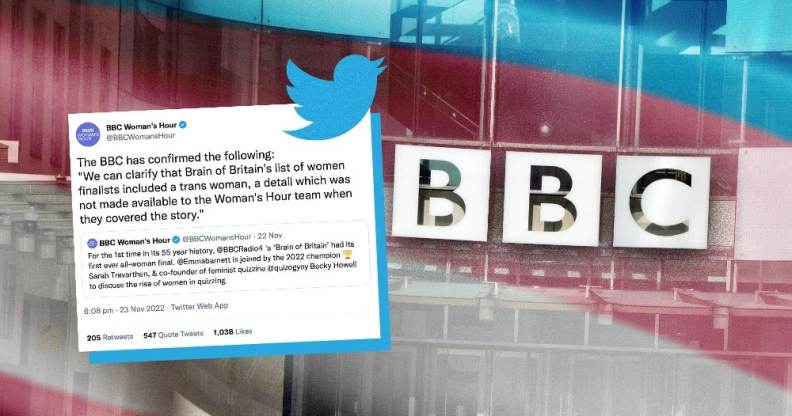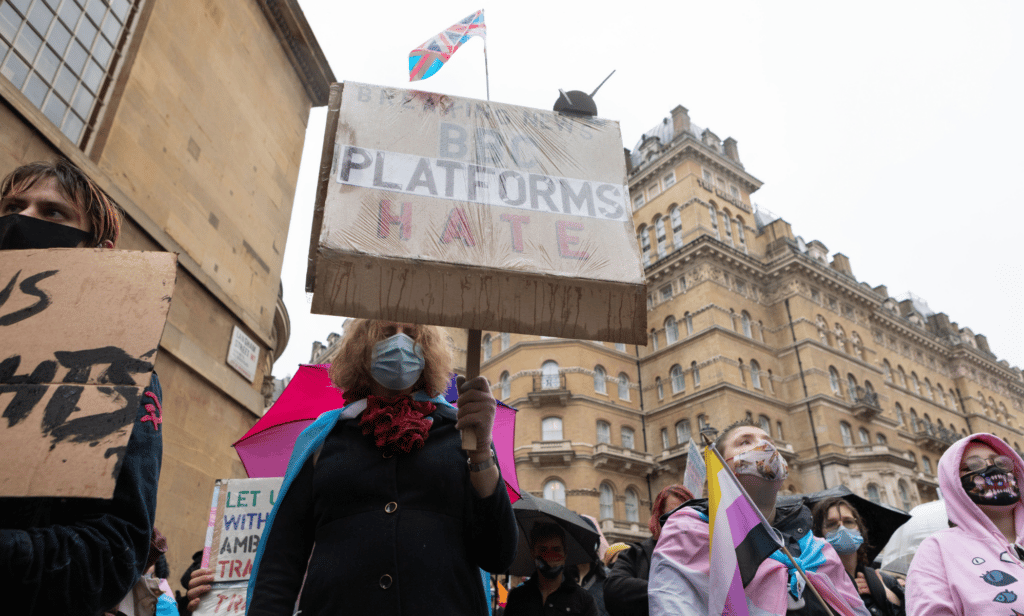BBC accused of ‘apologising for not being transphobic’ after Woman’s Hour ‘clarification’

BBC tweet
The BBC has been criticised for “apologising to transphobes for not being transphobic” after it issued a ‘clarification’ on its Brain of Britain final coverage.
Brain of Britain is a general knowledge quiz that is broadcast on BBC’s Radio 4 in which contestants from across the UK test their trivia knowledge against each other. Radio 4 presenter Russell Davies, who chairs the show, described it as the “first-ever all-women final”.
This was reiterated in a tweet on Tuesday (22 November) from BBC Woman’s Hour which described the moment as the “first time” in Brain of Britain’s “55-year history” that there was an “all-woman final”.
However, just a day later, the BBC followed up the celebratory tweet from the Woman’s Hour account with a ‘clarification’ that one of the quizzers, Emma Laslett, is a trans woman. Laslett is a former Mastermind contestant who wore a trans Pride flag on the British TV show and had the Stonewall Riots as her specialist subject.
“The BBC has confirmed the following: ‘We can clarify that Brain of Britain‘s list of women finalists included a trans woman, a detail which was not made available to the Woman’s Hour team when they covered the story,'” the tweet read.
The BBC has confirmed the following:
"We can clarify that Brain of Britain's list of women finalists included a trans woman, a detail which was not made available to the Woman's Hour team when they covered the story." https://t.co/2puvULsp77
— BBC Woman's Hour (@BBCWomansHour) November 23, 2022
Predictably, the BBC clarification came after some listeners and people on social media took issue with the broadcaster putting out a trans-inclusive statement and with Laslett being trans.
Trans Media Watch’s Jane Fae told PinkNews that she was “both puzzled and concerned” by the BBC’s statement outing Laslett on Twitter.
“I very much doubt that they would make such a statement in respect of any other minority,” Fae said. “Though perhaps, I am wrong, and we can look forward to statements explaining how many individuals of Celtic, Black, Jewish and Aryan origin are on the national football team in the future.”
Fae also questioned if the BBC had considered the legality of the clarification statement as it may have breached “data protection laws in making it” and section 7.3 of the Ofcom Broadcasting Code.
The section stipulates that contestants must be “informed about potential risks arising from their participation in the programme which may affect their welfare” and “any steps the broadcaster and/or programme maker intends to take to mitigate these”.
Trans Media Watch will be “raising this issue at the earliest possible opportunity” with the broadcaster, Fae said.
PinkNews has contacted the BBC for comment.
Other people on social media criticised the BBC for the statement and said it appeared the broadcaster was “apologising to transphobes for not being transphobic”.
I'd like @BBCWomansHour to follow-up with the 'so what?'
Brain of Britain is a general knowledge quiz. This isn't like athletics, where the question is about physical advantage. So what if there's a trans woman finalist? It's still an all-women final! https://t.co/iRUJ7BKSdM— Ash Sarkar (@AyoCaesar) November 24, 2022
We are living in an era where the BBC is apologising to transphobes for not being transphobic.
Last year, @BBCNews quoted a cis woman as a source on the behaviour of some trans women, who later said she wanted famous trans women lynched, and no-one involved got fired. https://t.co/OiWGuBU25e— @[email protected] (@AidanCTweets) November 24, 2022
So it's an all women final then? This clarification showcases the transphobia that is obvious in our media elite. And in the current climate, it's a dangerous path to go down. https://t.co/wVbY7oVzFp— Robert Gordon (@Robert_Gordon_) November 24, 2022
Hey you didn’t break down every demographic of every woman in the final! How will I know of there was an Indian woman or a short woman or a green eyed woman????? It’s really important the public knows!!!!!!!!!!!!!!!!!!!!!!!!!!!!
— এদেন Bose-Rosling (She/They/Ze/Xe) (@AidanTheJester) November 24, 2022
"Sorry we made the heinous crime of not immediately identifying a trans woman as trans, we will ensure to uphold our institution's regular standards of transphobia going forward"
They never apologised this much when they published the Lily Case piece claiming we're all rapists. https://t.co/ce5jyUd3eQ— Elaine Scattermoon (@scattermoon) November 24, 2022
The BBC has been called out multiple times for posting anti-trans articles.
Senior MPs branded the BBC as “institutionally transphobic” in 2020, and thousands have condemned the broadcaster for uncritically platforming anti-trans groups like the LGB Alliance as well as “censoring” trans issues.
In October 2021, BBC News was widely condemned for publishing a piece titled “We’re being pressured into sex by some trans women”, which used a survey of 80 people to claim that trans lesbians are pressuring cis lesbians into sex.
The article also included an interview with Lily Cade, an openly anti-trans former porn performer and director who had been accused by multiple women of sexual assault. Cade was eventually removed from the article after posting blogs calling for the “lynching” and “execution” of trans women.

The BBC has been called out for being “institutionally transphobic” and posting anti-trans articles in the past. (Getty)
Thousands of people signed an open letter to BBC upper management and editorial staff, saying the article used a “deeply flawed study” to suggest trans women “pose a risk to cisgender women”.
The article also prompted mass protests outside BBC headquarters and queer staff resigning in droves.
The BBC has doggedly insisted the article was impartial and subject to a “rigorous editorial process”. Yet, the company’s complaints team found it fell below the broadcaster’s editorial standards.
Leading European LGBTQ+ rights organisation IGLA-Europe highlighted in its annual review, released in February, that “anti-trans rhetoric continued to cause serious damage in the UK” over the past year. The report specifically cited the BBC as a leading agent in “bias-motivated speech”.

